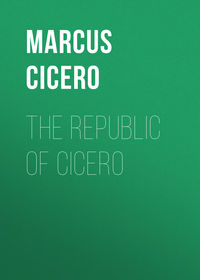 полная версия
полная версияThe Letters of Cicero, Volume 1
II. But it may be said that among even such men as these there occur serious disputes, many wrongful acts are committed, and hotly contested litigation is the result. As though I ever thought that you had no trouble to contend with! I know that the trouble is exceedingly great, and such as demands the very greatest prudence; but remember that it is prudence much more than fortune on which, in my opinion, the result of your trouble depends. For what trouble is it to govern those over whom you are set, if you do but govern yourself? That may be a great and difficult task to others, and indeed it is most difficult: to you it has always been the easiest thing in the world, and indeed ought to be so, for your natural disposition is such that, even without discipline, it appears capable of self-control; whereas a discipline has, in fact, been applied that might educate the most faulty of characters. But while you resist, as you do, money, pleasure, and every kind of desire yourself, there will, I am to be told, be a risk of your not being able to suppress some fraudulent banker or some rather over-extortionate tax-collector! For as to the Greeks, they will think, as they behold the innocence of your life, that one of the heroes of their history, or a demigod from heaven, has come down into the province. And this I say, not to induce you to act thus, but to make you glad that you are acting or have acted so. It is a splendid thing to have been three years in supreme power in Asia without allowing statue, picture, plate, napery, slave, anyone's good looks, or any offer of money—all of which are plentiful in your province—to cause you to swerve from the most absolute honesty and purity of life. What can be imagined so striking or so desirable as that a virtue, a command over the passions, a self-control such as yours, are not remaining in darkness and obscurity, but have been set in the broad daylight of Asia, before the eyes of a famous province, and in the hearing of all nations and peoples? That the inhabitants are not being ruined by your progresses, drained by your charges, agitated by your approach? That there is the liveliest joy, public and private, wheresoever you come, the city regarding you as a protector and not a tyrant, the private house as a guest and not a plunderer?
III. But in these matters I am sure that mere experience has by this time taught you that it is by no means sufficient to have these virtues yourself, but that you must keep your eyes open and vigilant, in order that in the guardianship of your province you may be considered to vouch to the allies, the citizens, and the state, not for yourself alone, but for all the subordinates of your government. However, you have in the persons of your legati men likely to have a regard for their own reputation. Of these in rank, position, and age Tubero is first; who, I think, particularly as he is a writer of history, could select from his own Annals many whom he would like and would be able to imitate. Allienus, again, is ours, as well in heart and affection, as in his conformity to our principles. I need not speak of Gratidius: I am sure that, while taking pains to preserve his own reputation, his fraternal affection for us makes him take pains for ours also.184 Your quæstor is not of your own selection, but the one assigned you by lot. He is bound both to act with propriety of his own accord, and to conform to the policy and principles which you lay down. But should any one of these adopt a lower standard of conduct, you should tolerate such behaviour, if it goes no farther than a breach, in his private capacity, of the rules by which he was bound, but not if it goes to the extent of employing for gain the authority which you granted him as a promotion. For I am far from thinking, especially since the moral sentiments of the day are so much inclined to excessive laxity and self-seeking, that you should investigate every case of petty misconduct, and thoroughly examine every one of these persons; but that you should regulate your confidence by the trustworthiness of its recipient. And among such persons you will have to vouch for those whom the Republic has itself given you as companions and assistants in public affairs, at least within the limits which I have before laid down.
IV. In the case, however, of those of your personal staff or official attendants whom you have yourself selected to be about you—who are usually spoken of as a kind of prætor's cohort—we must vouch, not only for their acts, but even for their words. But those you have with you are the sort of men of whom you may easily be fond when they are acting rightly, and whom you may very easily check when they shew insufficient regard for your reputation. By these, when you were raw to the work, your frank disposition might possibly have been deceived—for the better a man is the less easily does he suspect others of being bad—now, however, let this third year witness an integrity as perfect as the two former, but still more wary and vigilant. Listen to that only which you are supposed to listen to; don't let your ears be open to whispered falsehoods and interested suggestions. Don't let your signet ring be a mere implement, but, as it were, your second self: not the minister of another's will, but a witness of your own. Let your marshal hold the rank which our ancestors wished him to hold, who, looking upon this place as not one of profit, but of labour and duty, scarcely ever conferred it upon any but their freedmen, whom they indeed controlled almost as absolutely as their slaves. Let the lictor be the dispenser of your clemency, not his own; and let the fasces and axes which they carry before you constitute ensigns rather of rank than of power. Let it, in fact, be known to the whole province that the life, children, fame, and fortunes of all over whom you preside are exceedingly dear to you. Finally, let it be believed that you will, if you detect it, be hostile not only to those who have accepted a bribe, but to those also who have given it. And, indeed, no one will give anything, if it is made quite clear that nothing is usually obtained from you through those who pretend to be very influential with you. Not, however, that the object of this discourse is to make you over-harsh or suspicious towards your staff. For if any of them in the course of the last two years has never fallen under suspicion of rapacity, as I am told about Cæsius and Chærippus and Labeo—and think it true, because I know them—there is no authority, I think, which may not be intrusted to them, and no confidence which may not be placed in them with the utmost propriety, and in anyone else like them. But if there is anyone of whom you have already had reason to doubt, or concerning whom you have made some discovery, in such a man place no confidence, intrust him with no particle of your reputation.
V. If, however, you have found in the province itself anyone, hitherto unknown to us, who has made his way into intimacy with you, take care how much confidence you repose in him; not that there may not be many good provincials, but, though we may hope so, it is risky to be positive. For everyone's real character is covered by many wrappings of pretence and is concealed by a kind of veil: face, eyes, expression very often lie, speech most often of all. Wherefore, how can you expect to find in that class185 any who, while foregoing for the sake of money all from which we can scarcely tear ourselves away,186 will yet love you sincerely and not merely pretend to do so from interested motives? I think, indeed, it is a hard task to find such men, especially if we notice that the same persons care nothing for almost any man out of office, yet always with one consent shew affection for the prætors. But of this class, if by chance you have discovered any one to be fonder of you—for it may so happen—than of your office, such a man indeed gladly admit upon your list of friends: but if you fail to perceive that, there is no class of people you must be more on your guard against admitting to intimacy, just because they are acquainted with all the ways of making money, do everything for the sake of it, and have no consideration for the reputation of a man with whom they are not destined to pass their lives. And even among the Greeks themselves you must be on your guard against admitting close intimacies, except in the case of the very few, if such are to be found, who are worthy of ancient Greece. As things now stand, indeed, too many of them are untrustworthy, false, and schooled by long servitude in the arts of extravagant adulation. My advice is that these men should all be entertained with courtesy, but that close ties of hospitality or friendship should only be formed with the best of them: excessive intimacies with them are not very trustworthy—for they do not venture to oppose our wishes—and they are not only jealous of our countrymen, but of their own as well.
VI. And now, considering the caution and care that I would shew in matters of this kind—in which I fear I may be somewhat over-severe—what do you suppose my sentiments are in regard to slaves? Upon these we ought to keep a hold in all places, but especially in the provinces. On this head many rules may be laid down, but this is at once the shortest and most easily maintained—that they should behave during your progresses in Asia as though you were travelling on the Appian way, and not suppose that it makes any difference whether they have arrived at Tralles or Formiæ. But if, again, any one of your slaves is conspicuously trustworthy, employ him in your domestic and private affairs; but in affairs pertaining to your office as governor, or in any department of the state, do not let him lay a finger. For many things which may, with perfect propriety, be intrusted to slaves, must yet not be so intrusted, for the sake of avoiding talk and hostile remark. But my discourse, I know not how, has slipped into the didactic vein, though that is not what I proposed to myself originally. For what right have I to be laying down rules for one who, I am fully aware, in this subject especially, is not my inferior in wisdom, while in experience he is even my superior? Yet, after all, if your actions had the additional weight of my approval, I thought that they would seem more satisfactory to yourself. Wherefore, let these be the foundations on which your public character rests: first and foremost your own honesty and self-control, then the scrupulous conduct of all your staff, the exceedingly cautious and careful selection in regard to intimacies with provincials and Greeks, the strict and unbending government of your slaves. These are creditable even in the conduct of our private and everyday business: in such an important government, where morals are so debased and the province has such a corrupting influence, they must needs seem divine. Such principles and conduct on your part are sufficient to justify the strictness which you have displayed in some acts of administration, owing to which I have encountered certain personal disputes with great satisfaction, unless, indeed, you suppose me to be annoyed by the complaints of a fellow like Paconius—who is not even a Greek, but in reality a Mysian or Phrygian—or by the words of Tuscenius, a madman and a knave, from whose abominable jaws you snatched the fruits of a most infamous piece of extortion with the most complete justice.
VII. These and similar instances of your strict administration in your province we shall find difficulty in justifying, unless they are accompanied by the most perfect integrity: wherefore let there be the greatest strictness in your administration of justice, provided only that it is never varied from favour, but is kept up with impartiality. But it is of little avail that justice is administered by yourself with impartiality and care, unless the same is done by those to whom you have intrusted any portion of this duty. And, indeed, in my view there is no very great variety of business in the government of Asia: the entire province mainly depends on the administration of justice. In it we have the whole theory of government, especially of provincial government, clearly displayed: all that a governor has to do is to shew consistency and firmness enough, not only to resist favouritism, but even the suspicion of it. To this also must be added courtesy in listening to pleaders, consideration in pronouncing a decision, and painstaking efforts to convince suitors of its justice, and to answer their arguments. It is by such habits that C. Octavius has recently made himself very popular;187 in whose court, for the first time,188 the lictor did not interfere, and the marshal kept silence, while every suitor spoke as often and as long as he chose. In which conduct he would perhaps have been thought over-lax, had it not been that this laxity enabled him to maintain the following instance of severity. The partisans of Sulla were forced to restore what they had taken by violence and terrorism. Those who had made inequitable decrees, while in office, were now as private citizens forced to submit to the principles they had established. This strictness on his part would have been thought harsh, had it not been rendered palatable by many sweetening influences of courtesy. But if this gentleness was sufficient to make him popular at Rome, where there is such haughtiness of spirit, such unrestrained liberty, such unlimited licence of individuals, and, in fine, so many magistrates, so many means of obtaining protection, such vast power in the hands of the popular assembly, and such influence exercised by the senate, how welcome must a prætor's courtesy be in Asia, in which there is such a numerous body of citizens and allies, so many cities, so many communities, all hanging on one man's nod, and in which there are no means of protection, no one to whom to make a complaint, no senate, no popular assembly! Wherefore it requires an exalted character, a man who is not only equitable from natural impulse, but who has also been trained by study and the refinements of a liberal education, so to conduct himself while in the possession of such immense power, that those over whom he rules should not feel the want of any other power.
VIII. Take the case of the famous Cyrus, portrayed by Xenophon, not as an historical character, but as a model of righteous government, the serious dignity of whose character is represented by that philosopher as combined with a peculiar courtesy. And, indeed, it is not without reason that our hero Africanus used perpetually to have those books in his hands, for there is no duty pertaining to a careful and equitable governor which is not to be found in them. Well, if he cultivated those qualities, though never destined to be in a private station, how carefully ought those to maintain them to whom power is given with the understanding that it must be surrendered, and given by laws under whose authority they must once more come? In my opinion all who govern others are bound to regard as the object of all their actions the greatest happiness of the governed. That this is your highest object, and has been so since you first landed in Asia, has been published abroad by consistent rumour and the conversation of all. It is, let me add, not only the duty of one who governs allies and citizens, but even of one who governs slaves and dumb animals, to serve the interests and advantage of those under him. In this point I notice that everyone agrees that you take the greatest pains: no new debt is being contracted by the states, while many have been relieved by you from a heavy and long-standing one. Several cities that had become dilapidated and almost deserted—of which one was the most famous state in Ionia, the other in Caria, Samus and Halicarnassus—have been given a new life by you: there is no party fighting, no civil strife in the towns: you take care that the government of the states is administered by the best class of citizens: brigandage is abolished in Mysia; murder suppressed in many districts; peace is established throughout the province; and not only the robberies usual on highways and in country places, but those more numerous and more serious ones in towns and temples, have been completely stopped: the fame, fortunes, and repose of the rich have been relieved of that most oppressive instrument of prætorial rapacity—vexatious prosecution; the expenses and tribute of the states are made to fall with equal weight on all who live in the territories of those states: access to you is as easy as possible: your ears are open to the complaints of all: no man's want of means or want of friends excludes him, I don't say from access to you in public and on the tribunal, but even from your house and chamber: in a word, throughout your government there is no harshness or cruelty—everywhere clemency, mildness, and kindness reign supreme.
IX. What an immense benefit, again, have you done in having liberated Asia from the tribute exacted by the ædiles a measure which cost me some violent controversies! For if one of our nobles complains openly that by your edict, "No moneys shall be voted for the games," you have robbed him of 200 sestertia, what a vast sum of money would have been paid, had a grant been made to the credit of every magistrate who held games, as had become the regular custom! However, I stopped these complaints by taking up this position—what they think of it in Asia I don't know, in Rome it meets with no little approval and praise—I refused to accept a sum of money which the states had decreed for a temple and monument in our honour, though they had done so with the greatest enthusiasm in view both of my services and of your most valuable benefactions; and though the law contained a special and distinct exception in these words, "that it was lawful to receive for temple or monument"; and though again the money was not going to be thrown away, but would be employed on decorating a temple, and would thus appear to have been given to the Roman people and the immortal Gods rather than to myself—yet, in spite of its having desert, law, and the wishes of those who offered the gift in its favour, I determined that I must not accept it, for this reason among others, namely, to prevent those, to whom such an honour was neither due nor legal, from being jealous. Wherefore adhere with all your heart and soul to the policy which you have hitherto adopted—that of being devoted to those whom the senate and people of Rome have committed and intrusted to your honour and authority, of doing your best to protect them, and of desiring their greatest happiness. Even if the lot had made you governor of Africans, or Spaniards, or Gauls—uncivilized and barbarous nations—it would still have been your duty as a man of feeling to consult for their interests and advantage, and to have contributed to their safety. But when we rule over a race of men in which civilization not only exists, but from which it is believed to have spread to others, we are bound to repay them, above all things, what we received from them. For I shall not be ashamed to go so far—especially as my life and achievements have been such as to exclude any suspicion of sloth or frivolity—as to confess that, whatever I have accomplished, I have accomplished by means of those studies and principles which have been transmitted to us in Greek literature and schools of thought. Wherefore, over and above the general good faith which is due to all men, I think we are in a special sense under an obligation to that nation, to put in practice what it has taught us among the very men by whose maxims we have been brought out of barbarism.
X. And indeed Plato, the fountain-head of genius and learning, thought that states would only be happy when scholars and philosophers began being their rulers, or when those who were their rulers had devoted all their attention to learning and philosophy. It was plainly this union of power and philosophy that in his opinion might prove the salvation of states. And this perhaps has at length fallen to the fortune of the whole empire: certainly it has in the present instance to your province, to have a man in supreme power in it, who has from boyhood spent the chief part of his zeal and time in imbibing the principles of philosophy, virtue, and humanity. Wherefore be careful that this third year, which has been added to your labour, may be thought a prolongation of prosperity to Asia. And since Asia was more fortunate in retaining you than I was in my endeavour to bring you back, see that my regret is softened by the exultation of the province. For if you have displayed the very greatest activity in earning honours such as, I think, have never been paid to anyone else, much greater ought your activity to be in preserving these honours. What I for my part think of honours of that kind I have told you in previous letters. I have always regarded them, if given indiscriminately, as of little value, if paid from interested motives, as worthless: if, however, as in this case, they are tributes to solid services on your part, I hold you bound to take much pains in preserving them. Since, then, you are exercising supreme power and official authority in cities, in which you have before your eyes the consecration and apotheosis of your virtues, in all decisions, decrees, and official acts consider what you owe to those warm opinions entertained of you, to those verdicts on your character, to those honours which have been rendered you. And what you owe will be to consult for the interests of all, to remedy men's misfortunes, to provide for their safety, to resolve that you will be both called and believed to be the "father of Asia."
XI. However, to such a resolution and deliberate policy on your part the great obstacle are the publicani: for, if we oppose them, we shall alienate from ourselves and from the Republic an order which has done us most excellent service, and which has been brought into sympathy with the Republic by our means; if, on the other hand, we comply with them in every case, we shall allow the complete ruin of those whose interests, to say nothing of their preservation, we are bound to consult. This is the one difficulty, if we look the thing fairly in the face, in your whole government. For disinterested conduct on one's own part, the suppression of all inordinate desires, the keeping a check upon one's staff, courtesy in hearing causes, in listening to and admitting suitors—all this is rather a question of credit than of difficulty: for it does not depend on any special exertion, but rather on a mental resolve and inclination. But how much bitterness of feeling is caused to allies by that question of the publicani we have had reason to know in the case of citizens who, when recently urging the removal of the port-dues in Italy, did not complain so much of the dues themselves, as of certain extortionate conduct on the part of the collectors. Wherefore, after hearing the grievances of citizens in Italy, I can comprehend what happens to allies in distant lands. To conduct oneself in this matter in such a way as to satisfy the publicani, especially when contracts have been undertaken at a loss, and yet to preserve the allies from ruin, seems to demand a virtue with something divine in it, I mean a virtue like yours. To begin with, that they are subject to tax at all, which is their greatest grievance, ought not to be thought so by the Greeks, because they were so subject by their own laws without the Roman government. Again, they cannot despise the word publicanus, for they have been unable to pay the assessment according to Sulla's poll-tax without the aid of the publican. But that Greek publicani are not more considerate in exacting the payment of taxes than our own may be gathered from the fact that the Caunii, and all the islands assigned to the Rhodians by Sulla, recently appealed to the protection of the senate, and petitioned to be allowed to pay their tax to us rather than to the Rhodians. Wherefore neither ought those to revolt at the name of a publicanus who have always been subject to tax, nor those to despise it who have been unable to make up the tribute by themselves, nor those to refuse his services who have asked for them. At the same time let Asia reflect on this, that if she were not under our government, there is no calamity of foreign war or internal strife from which she would be free. And since that government cannot possibly be maintained without taxes, she should be content to purchase perpetual peace and tranquillity at the price of a certain proportion of her products.
XII. But if they will fairly reconcile themselves to the existence and name of publican, all the rest may be made to appear to them in a less offensive light by your skill and prudence. They may, in making their bargains with the publicani, not have regard so much to the exact conditions laid down by the censors as to the convenience of settling the business and freeing themselves from farther trouble. You also may do, what you have done splendidly and are still doing, namely, dwell on the high position of the publicani, and on your obligations to that order, in such a way as—putting out of the question all considerations of your imperium and the power of your official authority and dignity—to reconcile the Greeks with the publicani, and to beg of those, whom you have served eminently well, and who owe you everything, to suffer you by their compliance to maintain and preserve the bonds which unite us with the publicani. But why do I address these exhortations to you, who are not only capable of carrying them out of your own accord without anyone's instruction, but have already to a great extent thoroughly done so? For the most respectable and important companies do not cease offering me thanks daily, and this is all the more gratifying to me because the Greeks do the same. Now it is an achievement of great difficulty to unite in feeling things which are opposite in interests, aims, and, I had almost said, in their very nature. But I have not written all this to instruct you—for your wisdom requires no man's instruction—but it has been a pleasure to me while writing to set down your virtues, though I have run to greater length in this letter than I could have wished, or than I thought I should.









